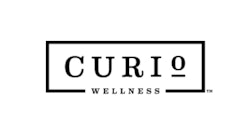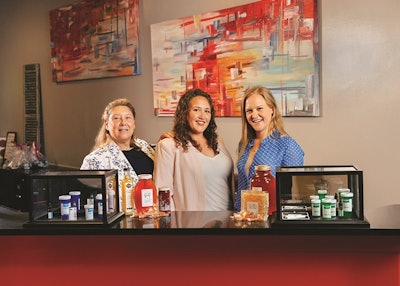
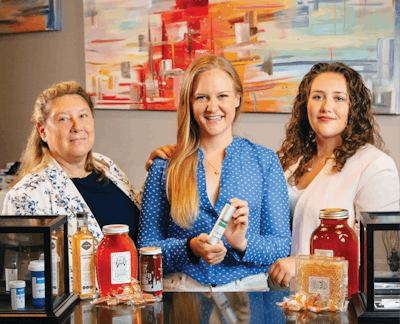
Before her mother, Frances Keeffe, was diagnosed with amyotrophic lateral sclerosis (ALS), Etain co-founder and CEO Amy Peckham hadn’t given much thought to the medical potential of cannabis or considered it as a treatment option for “Granny Franny,” as Amy’s four children called her. It was 2009, and cannabis was still illegal in New York and therefore off limits.
Amy accompanied her mother to many of her appointments, and it was difficult to watch. Keeffe’s prescription list grew to the point where she was taking 18 medications a day to manage her symptoms, which included debilitating pain, excess saliva, digestion problems and nausea. Amy’s father, a lawyer, questioned the doctors, but with so many medical professionals involved, it was hard to know what was best and who was right.
“Never was [my mom considered] a holistic individual, with quality of life needs. [Her treatment] was taken piece by piece, and no one [questioned other] professionals,” Amy says. “It led to situations where she was quarantined because of drug reactions. It was clearly the combination of the medications, yet no one would decouple all the overprescribing. That was a very frustrating situation. My father had been a practicing attorney, and he would just sit there saying, ‘They’re killing her, they’re killing her,’ (as if she wasn’t in a terminally ill situation).”
A doctor suggested cannabis in 2012, the year her mother died, but with no access to tested, regulated product at the time, it wasn’t an option. Keeffe—who followed doctor’s orders and laws by the book—would not consider something illegal. But Amy wished her mom’s situation were different, and that there were an alternative.
Just two years later, the legal landscape would change, and Amy and her two daughters would not only champion the benefits of the plant but also launch a New York-based medical cannabis provider, called Etain.
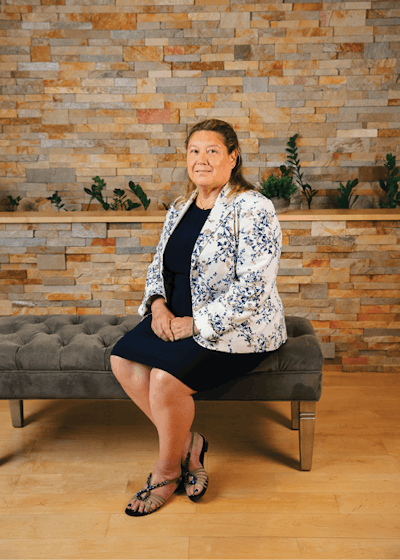
Business and Personal
While Keeffe was struggling with ALS, also known as Lou Gehrig’s disease, Amy’s daughter Hillary Peckham was in college, dealing with a medical challenge of her own: After a failed hip surgery in her teens, Hillary was left in intense pain and had to relearn how to walk.
“I’m still in a lot of pain from my injury, and it’s been almost 10 years,” says Hillary, now Etain’s COO. “I was trying to get through school and college and was given an accelerant, like Adderall, and Percocet, so something to help me … stay awake while I was also taking an opioid. That didn’t give me any quality of life, and I had a lot of reactions to those types of medications.”
She longed for a better alternative.
Hillary was pursuing a career in music therapy, and her sister Keeley Peckham, who studied plant science and cell biology in college, was in New Orleans preparing to launch a horticultural therapy program at nursing homes in the area.
In 2014, when New York legalized cannabis for medicinal use, Amy dug into the research available and followed the legislative hearings, and it changed her perception of cannabis.
“I just felt very strongly that people should have more control over their alternative choices for care, and that there should be a more open discussion with the medical community,” Amy says. “There should be product safety, and as a mother of four, I wanted consumer safety.”
The Peckhams, despite their unfamiliarity with cannabis initially, had a background that happened to be ideal for running a vertically integrated cannabis operation. Amy had the legal and business acumen from her involvement in her father’s law practice and her husband’s family-owned construction company. Keeley, who is now chief horticultural officer at Etain, had the plant science background, and Hillary decided to pursue a business certificate at Dartmouth College.
But Hillary was surprised when her mom pitched the idea.
“For me, I really resented having to take any kind of drugs, and [cannabis] was not at all anything I was interested in,” Hillary says. “It was always a forbidden topic within our family—you can drink but not anything else. I was a little shocked, and it took me a little while to think about it and embrace it.”But she was eventually attracted to the opportunity for patients to live better lives and opportunities for women leaders.
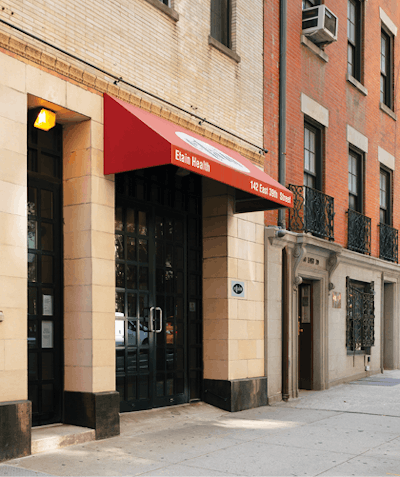
From a Slow Start to Building a Team
Ten medical cannabis companies in New York serve more than 107,870 (and counting) certified patients. Well-known giants like Curaleaf, MedMen and Vireo Health are just some of the other organizations operating in the state. Each company operates a manufacturing facility and up to four dispensaries, per state regulations, which is partly why Etain closed its Albany location in 2017 to make way for its Manhattan dispensary, the smallest of its four storefronts, sandwiched between iconic New York City brownstones.
When Etain applied for its state license in 2015, the company had to commit to open a dispensary within 180 days. The Peckhams made that deadline but weren’t greeted with lines at the former Albany store or the Kingston location as seen in other states when they first roll out medical legalization. Not one patient visited that first day. Or the next. Or the entire week of Jan. 7, 2016.
“It took us two weeks to see our first patient,” Hillary says. “Things steadily improved from that point. There definitely was a lapse, and that was nerve-racking when you open your doors. It was a good opportunity for additional training for everybody to get ready, but they were very excited when the first person walked through the dispensary.”
After the slow start, the company began to grow (and now serves 25,000 patients in the state). Finding the right people to join the team was a major obstacle during the early years, recalls Hillary.
“Five years ago, when we were preparing for our [state license] … there was really a lack of legitimate and standardized knowledge,” Hillary says. “That still is not necessarily developed today, but it’s come a long way. Finding people with credentials and a real resume who wanted to work was very difficult. Most of the time we had to search in other industries to try and find relevant expertise because it didn’t exist for the cannabis industry. So, we had to find pharmacists, pharmaceutical manufacturing expertise, horticultural expertise.
“Especially with the competitive [license process], they do background checks on everybody, so using a cannabis cultivator from the illicit market, usually they have some sort of criminal background that pops up, or if they do an investigation, issues come up,” Hillary continues. In New York, the Compassionate Care Act prohibits registered organizations from being managed by or employing anyone who has been convicted within the past 10 years of any felony of sale or possession of drugs, narcotics, or controlled substances. This restriction only applies to those managers or employees that come into contact with or handle medical marijuana, according to the health department.
“So you can’t really use [illicit growers] as a resource even if they have knowledge, which is just a conundrum in the industry, [along with] finding people that were committed to make the quality product we wanted,” Hillary says.
Part of that quality involves keeping growing conditions consistent to keep plants and the product consistent, Keeley says.
“We take a really scientific approach to change. When you do find somebody who is a good fit and is excited and [has] good ideas, there is also patience required,” Keeley says. “We can’t just change what we’re doing. In order to implement an improvement, you need to try it on a few plants, and then some more. We go through about a yearlong process of testing an idea before we put it in a full production setting.”
For Keeley and her family, producing quality products for their patients and making it as easy as possible to consume is the overarching mission.
“Everybody deserves access to safe product, and that’s one of the fundamental aspects we look for in our HR process,” Keeley says. “Safety is our No. 1 priority. Our current cultivation manager is excellent, and we really have a good team. And that’s true for all our departments. We’ve got a great team on manufacturing, on cultivation and on pharmacy, and finding a good leader for those teams has been totally essential to our success—and they are actually all women.”
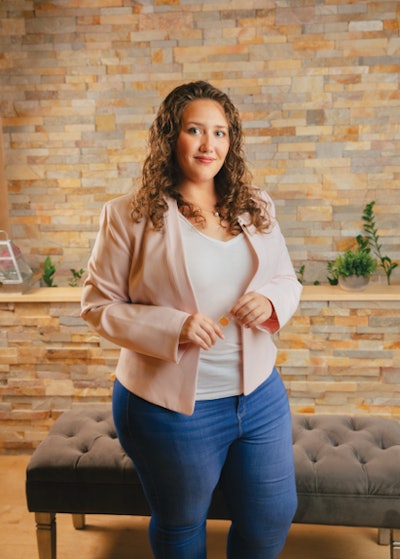
Women-Led
The fact that all team leaders are women at Etain isn’t surprising. Seventy percent of the company’s 50 employees are women. “In starting our own business, we wanted to create something that would help promote women in the workforce and give them opportunities to have a successful career,” Hillary says. They were able to find qualified candidates through Women Grow, a networking organization for women in the cannabis industry, and Joseph Stevens, their chief compliance officer, who had experience with hiring in the market.
“[My mom] Amy and I were inspired by the movement to have women enter the cannabis industry. Coming from a family that is in the construction industry, there is not a large female presence,” Hillary says. “We started going to a few conferences, and we found Women Grow. We were part of their very first meeting ever, and I was really captivated by the support that women give each other industry and the help that this gives patients.”
The Peckhams attribute much of their success to their team and say hiring women has been a smart business decision.
“Starting as a woman-owned company and making an effort to hire and promote women has turned out to be very advantageous,” Hillary says. “It has led to a staff that is very empathetic and compassionate toward patients. We’ve established that we’re willing to take as much time as necessary to answer any questions and help patients. All of our patients get a sit-down consult with our pharmacists, who are known to spend an hour with patients if that’s what they need, go through their medication history and also be in contact with their primary health provider so that patient is getting the best care possible.”
Often, the sit-down consults are patients’ first experiences with cannabis, Hillary says, and they want to be sure they feel safe, heard and understood.
Quality and Innovation
Innovation complements the Peckham’s mission to make cannabis accessible for all. Plus, New York regulations are stringent—combusting medical cannabis is not permissible, so you won’t find flower at dispensaries there. Edibles are also prohibited. Etain has created an array of products, all produced in-house, to make its medicine as accessible to as many people as possible.
“We just came out with our water-soluble powder that’s patent-pending, and we released our honey lozenges and lotions this year,” Hillary says. “We are actively pursuing and trying to figure out different methods of consumption to make it easier for people to medicate.”
That includes a peppermint-flavored spray for people who may not like the taste of cannabis or for people who have arthritis and may struggle with a pill bottle or fussy droppers that are prone to dispensing more medicine than the patient planned to consume. Etain’s tincture measures out in exact one-drop doses, Keeley says. The company also avoids any unnecessary additives and ingredients to reduce potential variability in the product and production complexity, Hillary says.
The cultivation facility follows the standard of Good Agricultural Practices, the manufacturing facility follows Good Manufacturing Practices and all ingredients are U.S. Pharmacopoeia Grade (USP), she adds.
“Especially the way we are regulated, reproducibility and consistency [are metrics] of our product,” Hillary says. Etain’s products are tested at the health department’s Wadsworth Center, which has strict criteria for acceptability. The company must predeclare dosing, with a small margin of error for how much potency can vary, Hillary says. All registered organizations are held to those same standards, according to the state health department.
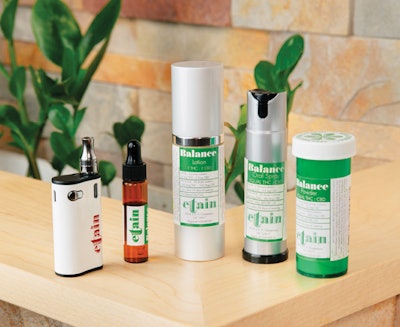
Future and Family
Although a bill to legalize adult-use cannabis died in the New York state legislature this past summer, it is something the Peckhams are monitoring closely as much of their future depends on how the state proceeds with an adult-use program. Should adult-use consumption be allowed in New York state without allowing medical companies a path to transition, it would “essentially put us out of business,” Hillary says.
But that isn’t the only roadblock Etain is facing. There are potential fixes to the medical program that could improve the market’s standing, including whether the state expands its limited list of qualifying conditions, which currently includes ALS, cancer, epilepsy and neuropathy. Since the program’s launch, chronic pain and opioid-use disorder have been added to that list, expanding the number of patients who qualify. After chronic pain was added in March 2017, the number of registered patients nearly tripled in the state by the end of that year, going from about 20,700 to close to 58,000.
“The limited range of products, I think, has contributed to slower growth in the New York program,” Hillary says. “I’d like to see more development and regulatory changes to allow for more diversity of product. Additionally, something that would make the program more successful is if doctors can prescribe medical marijuana at their own discretion, as opposed to having to … take a course and only being able to write a certification for a select list of diseases that are legislated.”
Regardless of what happens, the Etain team says it will evolve alongside the program and patient needs, always relying on family through the process. In addition to Amy, Keeley and Hillary, Hillary’s twin brother, J.D., works for Etain, as do her and Keeley’s husbands. Hillary considers it to be an advantage.
“We’re all committed to the same goal, and in a way that is very unique for an employee because it is our lives,” Hillary says. “As owners, we spend as much time as necessary to get the job done and always stay committed to the goal and why we started the company. People talk about work/life balance, but I think that not having one has made us successful and allowed us to adapt very quickly and make changes on the fly.”














